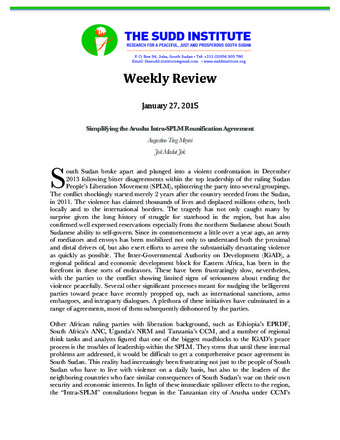Simplifying the Arusha Intra-SPLM Reunification Agreement

Authors: Jok Madut Jok, Augustino Ting Mayai
Organization: The Sudd Institute
Type: Weekly Reviews
Date: 27/01/2015
Publication Summary
South Sudan broke apart and plunged into a violent confrontation in December 2013 following bitter disagreements within the top leadership of the ruling Sudan People’s Liberation Movement (SPLM), splintering the party into several groupings. The conflict shockingly started merely 2 years after the country seceded from the Sudan, in 2011. The violence has claimed thousands of lives and displaced millions others, both locally and to the international borders. The tragedy has not only caught many by surprise given the long history of struggle for statehood in the region, but has also confirmed well expressed reservations especially from the northern Sudanese about South Sudanese ability to self-govern. Since its commencement a little over a year ago, an army of mediators and envoys has been mobilized not only to understand both the proximal and distal drivers of, but also exert efforts to arrest the substantially devastating violence as quickly as possible. The Inter-Governmental Authority on Development (IGAD), a regional political and economic development block for Eastern Africa, has been in the forefront in these sorts of endeavors. These have been frustratingly slow, nevertheless, with the parties to the conflict showing limited signs of seriousness about ending the violence peacefully. Several other significant processes meant for nudging the belligerent parties toward peace have recently propped up, such as international sanctions, arms embargoes, and intraparty dialogues. A plethora of these initiatives have culminated in a range of agreements, most of them subsequently dishonored by the parties.
Other African ruling parties with liberation background, such as Ethiopia’s EPRDF, South Africa’s ANC, Uganda’s NRM and Tanzania’s CCM, and a number of regional think tanks and analysts figured that one of the biggest roadblocks to the IGAD’s peace process is the troubles of leadership within the SPLM. They stress that until these internal problems are addressed, it would be difficult to get a comprehensive peace agreement in South Sudan. This reality had increasingly been frustrating not just to the people of South Sudan who have to live with violence on a daily basis, but also to the leaders of the neighboring countries who face similar consequences of South Sudan’s war on their own security and economic interests. In light of these immediate spillover effects to the region, the “Intra-SPLM” consultations begun in the Tanzanian city of Arusha under CCM’s facilitation and support from a variety of other entities. This effort recently resulted in a reunification agreement signed by SPLM groups’ principals and has indeed excited optimism towards peace, both locally and internationally. While the document does not necessarily address the immediate leadership contradictions in the party with detailed intervention strategies, it touches on the fundamental facets of reforms, many of which have been partly a source of current violent confrontations. This analysis reviews the Arusha Reunification Agreement and attempts to spur public debate on a newly instituted effort towards a genuine search for peace in South Sudan. The remainder of the review summarizes the main points of the Agreement, assesses public response, and sketchily provides some pointers for practice.
Jok Madut Jok is trained in the anthropology of health and holds a Ph.D. from the University of California, Los Angeles (UCLA). He is a fellow of Rift Valley Institute and Director of the Sudd Institute. Jok has held fellowship positions at a number of other institutions, including the United States Institute of Peace and the Woodrow Wilson International Center for Scholars. He also served in the Government of South Sudan as undersecretary in the Ministry of Culture and Heritage for three years. He has also worked in aid and development and author of four books and numerous articles covering gender, sexuality and reproductive health, humanitarian aid, ethnography of political violence, gender-based violence, war and slavery, and the politics of identity in South Sudan and Sudan. His book Breaking Sudan: The Search for Peace, was published in 2017 by OneWorld.
Augustino Ting Mayai's Biography
Augustino Ting Mayai is the former Managing Director of the Sudd Institute. He is a founding Research Director of the same institution, serving in this capacity for a decade. He holds a Ph.D. in Sociology, with concentrations on demography and development from the University of Wisconsin-Madison. He currently studies how state effectiveness affects child health outcomes in South Sudan and Ethiopia. Dr. Mayai has written extensively on South Sudan’s current affairs. August is the current Chair (Statistician General) of the National Bureau of Statistics, Government of South Sudan.
